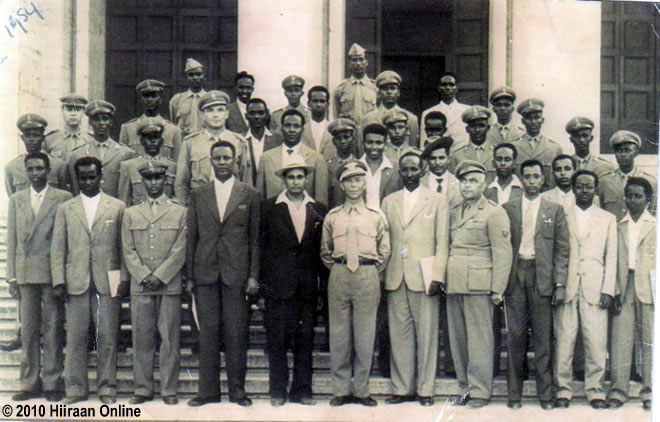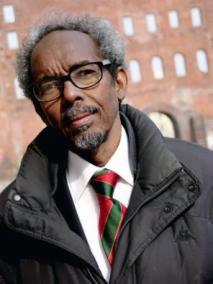
Historical Picture: Who is who in Somali Miltary
By Mohamed Haji (Ingiriis)
Friday, October 22, 2010

Dr. Mohamed Aden Sheikh
|
A shepherd, medical doctor, communist, émigré and former Somali minister, Dr Mohamed Aden Sheikh Aw-Mohamud deserves a loving eulogy that touches hearts, but not the one for Tony Judt. Born in Somali territory in Ethiopia, he was one of the leading Somali intellectuals of his peers.
He was Somalia’s parallel to Sali Berisha who embarked on his career as a cardiologist and ended up with the category of communism that Nelson Mandela summarised “it has always played an active role in the fight by colonial countries for their freedom, because the short-term objects of Communism would always correspondent with the long-term objects of freedom movements.”
Prior to associating himself with Dictator Mohamed Siad Barre, Dr Mohamed Aden was one of the most revered cardiologists in Somalia. As a young graduate who specialised cardiac surgery in Italy, he began his career at Digfer Hospital. Barre found him to be a very intelligent and exploited him in planning a coup against the civilian government.
It was a time when certain Somali intellectuals – Dr Mohamed Aden was a unique in this regard – came up with, what Dr Ali Jimale Ahmed described, moral justifications from the lore of the people for Barre’s ascendancy - Songs like geediga wadaay (Lead the track), guulwade siyaad aabihii garashada (Siad the victory-bearer and the father of knowledge) and caynaanka haay (may you hold onto the reins of power forever) became the hue-and-cry of an intellectual.
But Mohamed Siad, to quote from I. M. Lewis, “had the skills of a practical Machiavelli and the mind of a political computer,” notwithstanding, Dr Galayr, in his authoritative Notes on The State of Somali State, written in 1990 on Horn of Africa Journal, reckons that Barre was a man of an average mind. Galayr observed, “Personal relations, face to face contact and an insatiable demand for-raw-intelligence data have been his preferred ways for domination and control.”
Soon after Barre’s rise to power, Dr Mohamed Aden was not only appointed as Health Secretary, but also the speechwriter and ‘thinker of the regime.’ For many years, he acted as a Gramscian and was the Malcolm X of Siadist dogma and its conjunction with philosophical assumption of Scientific Socialism as an ideology within dynasty (Mohamed Siad was both Elijah Mohammed and great demagogue in this case).
But the two kinsmen fell out shortly before the eleventh hour (Barre called the doctor as his kinsman in an interview he gave to an Italian journalist). In that interview Barre said, “I dragged him (Mohamed Aden) out of the dirt, and now I referred him to hell” (read more about the interview on La Repubblica published in 19/04/1988). On the contrary, Barre dragged Mohamed Aden out of Digfer, not out of dirt.
By this time, Dr Mohamed Aden emerged as a victim of personal rule by his mystical mentor – and to put it the other way – a victim as his own drum, what a typical traditional Somali intellectual would say ‘kacaankii uu durbaanka u garaacayey ayaa isla isagii xabbisay.’ Before his imprisonment, the good doctor was the brain of Barre and too, according to his long-time friend, Pietro Petrucci, “The most valuable man inside Siad’s inner circle.”
Mohamed Aden was jailed in top-security prison Labaatan-Jirow in June 1982, along with Ismail Ali Obokor, Osman Mohamed Jelle, Omar Arte Qaalib, Warsame Abdullahi Ali (Juguf), Omar Haji Masalle and Mohamed Yusuf Weyrah. They were accused of implicating in a sinister plot against the regime.
Juguf was died inside the prison because of torture as Dr Mohamed Aden was trying to treat him with no avail. The perfect analogical illustration of this incident and its implication was close to the role of the young doctor in the movie of Iddi Amin “The Last King of Scotland”.
Asked by Italian newsmen for the reason behind his arrest for more than twice and why many Somalis finished their career in jail under Mohamed Siad Barre’s rule, Dr Mohamed Aden responded, “Barre wanted to stay (power) as long as possible and became increasingly suspicious of the people around him by starting to doubt many of us.”
When he was released from custody, thanks to his ties with Italian communist party, Dr Mohamed Aden was treated differently than other fellow inmates and the man liked to be called ‘The Teacher of Revolution’ granted him government factories – Itop and Jilayga – as for doctor’s personal property.
After the downfall of the regime, he co-authored a book about Somalia through Petrucci. To be sure, my study of his book, Arrivederci a Mogadiscio, has not aroused in me feeling of admiration. In the book, he permitted himself to be moralist and chauvinist at the same time. In fact, his career as a cardiac surgeon, perfected after Digfer, was to be where he was and yet not to be where he was.
I engaged with Dr Mohamed Aden three times – I had not done this by taking him critically as a politician, but by respecting him as a person and by reading his works closely. The first time I met him was in Kenya when he was with his long-time friend Ahmed Hasharo; the second time he was with Osman Jama Ali (Kallun) in Leicester, UK and the last time I saw him was last July when he came to London to attend the wedding of his nephew.
However, Dr Mohamed Aden was a rational man in regretting for his past blunder of involving in dictatorial regime. His last interview posted on numerous Somali media outlets proves that he was not just remorseful, but apologetic to the public for his role of the coup d’état of 1969. Somalia truly entails men like him who admit and learn from their mistakes.
May Allah rest him in peace and bless his family with utmost strength, aamiin.
Mohamed Haji (Ingiriis)
[email protected]